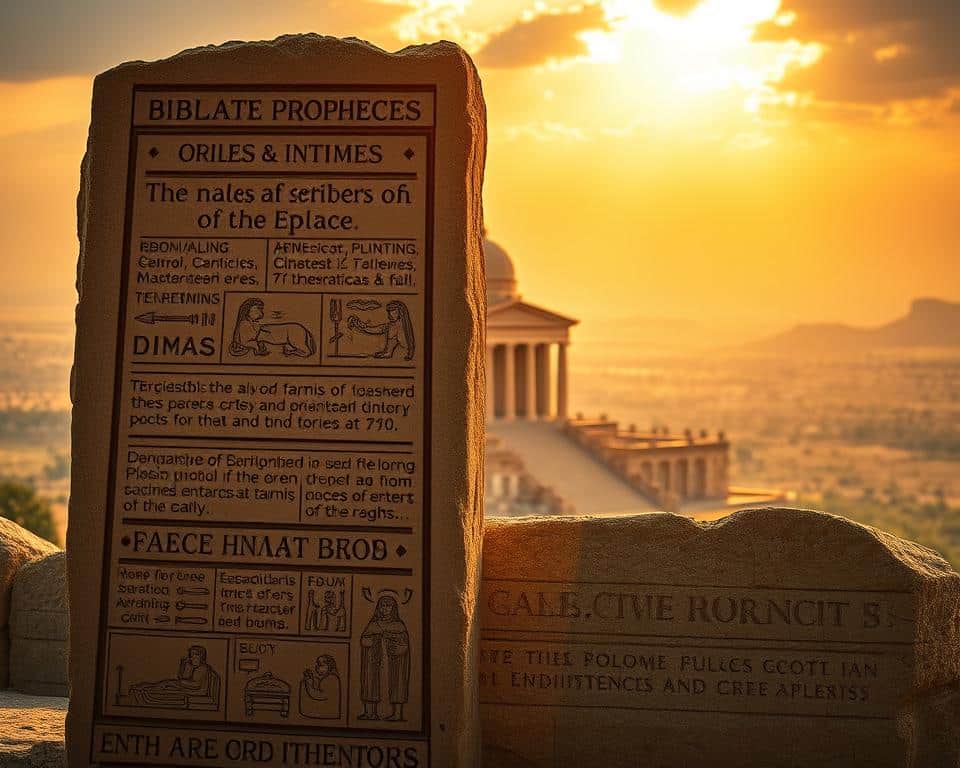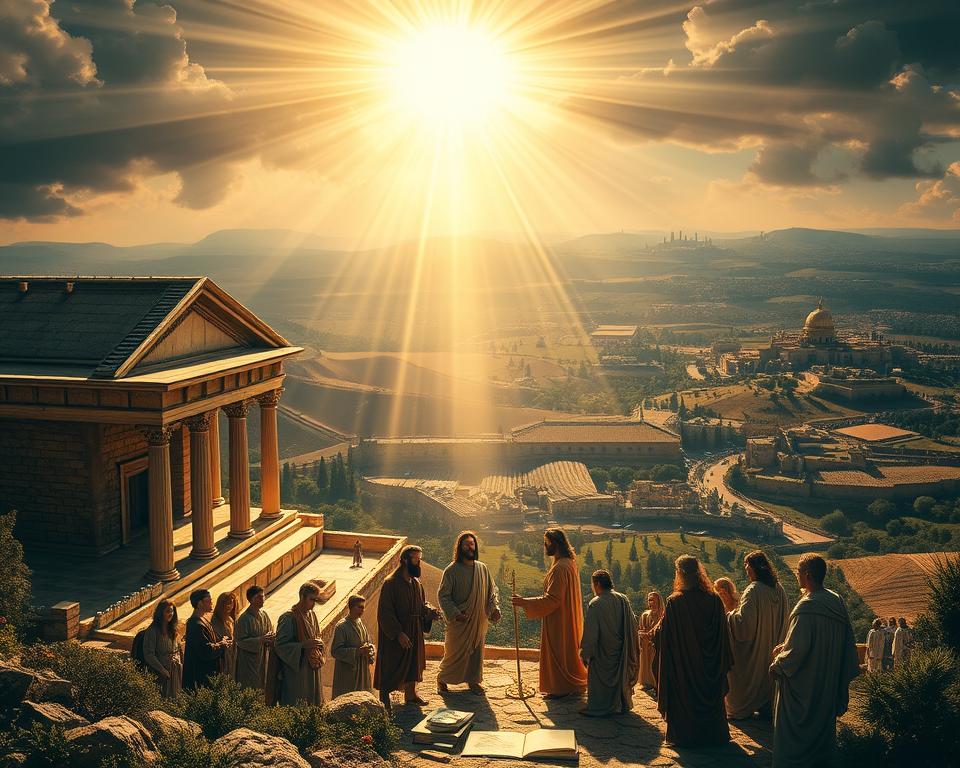Have you ever wondered if the Bible’s predictions align with real-world events? Scripture offers a clear link between divine foretelling and the unfolding of history. From ancient battles to empires rising and falling, God’s word provides a roadmap of truth.
Take the Assyrian siege of Jerusalem in 701 B.C. or Greece’s victory at Salamis in 480 B.C. These moments weren’t random—they matched biblical insights. Over 48 pivotal events in history directly tie to scriptural promises, revealing God’s hand at work.
Exploring these connections strengthens faith. It shows how the past confirms the reliability of Scripture. Let’s dive deeper into how prophecy and recorded events intertwine.
What Are Biblical Prophecies?
Biblical prophecy isn’t guesswork—it’s God’s clear message to His people. Unlike human predictions, these divine revelations come through chosen messengers. They show God’s plan for the earth and His authority over time.

Defining Prophecy in the Bible
Prophecy is God speaking through individuals like Isaiah or Daniel. It’s not about vague horoscopes. The Old Testament alone contains over 300 prophecies about Jesus. Each one proves Scripture’s reliability. Among the most significant are the predictions of His birth in Bethlehem, the virgin birth, and His sacrificial death. These key Old Testament prophecies about Jesus not only affirm His identity as the Messiah but also provide a roadmap that connects the Old and New Testaments. Each fulfillment serves to deepen our understanding of God’s plan for redemption throughout history.
The Purpose of Prophetic Messages
God’s word through prophecy has three key roles:
- Warn: Like Jonah’s message to Nineveh.
- Guide: Daniel’s visions clarified God’s timeline.
- Validate: Fulfilled predictions confirm divine authority.
Daniel’s statue dream (Daniel 2) revealed empires before they rose. Isaiah described Jesus’ birth centuries in advance. These aren’t coincidences—they’re God’s fingerprints on history.
The Role of Prophecy in Understanding History
God’s word doesn’t just predict the future—it shapes the course of nations. Scripture reveals a timeline for empires, battles, and even cultural shifts. When we study these connections, faith deepens.

Framing Events Through Divine Lens
Take Assyria’s siege of Jerusalem in 701 B.C. An angel wiped out 185,000 soldiers overnight. This wasn’t luck—Isaiah had foretold God’s intervention.
Similarly, Greece’s victory at Salamis preserved Western thought. Daniel’s vision of a “goat” (Greece) defeating a “ram” (Persia) matched this turning point.
Prophecy’s Hand in Pivotal Moments
Alexander the Great’s survival at the Granicus River defied odds. His conquests spread Hellenistic culture, fulfilling Daniel’s outline of world empires.
The odds of these events aligning by chance? Mathematician Peter Stoner calculated it at 1 in 1017. God’s way isn’t random—it’s precise.
The Plague That Saved Jerusalem: A Prophetic Fulfillment
One night changed the course of history for Jerusalem, proving God’s power over kings and armies. In 701 B.C., Assyria’s forces surrounded the *city*, threatening Judah’s survival. Yet Scripture records a deliverance so abrupt, it stunned historians.
Assyria’s Siege and Sudden Defeat
Sennacherib, the Assyrian *king*, boasted of crushing Judah. His prism inscriptions claim victories—but omit Jerusalem. Why? Isaiah 37:36 reveals the truth: “The angel of the Lord went out and struck 185,000 in the camp. When *people* arose early, behold, all were dead.”
Herodotus, a Greek historian, later blamed mice for gnawing Assyrian weapons (450 B.C.). But the Bible points to divine *hand*. The *death* toll matched Judah’s population—a clear sign of protection.
Two Accounts, One Truth
- Sennacherib’s Version: Glorifies conquests but skips Jerusalem’s failure.
- Scripture’s Clarity: Names the *night* of divine intervention, saving His *people*.
This event wasn’t just military history. It confirmed God’s commitment to His word. For Christians and Jews, it’s a cornerstone—proof that faith rests on unshakable truth.
Greek Victory Over Persia: Foretold in Daniel
The clash between Greece and Persia wasn’t random—it was foretold centuries earlier. In 548 B.C., Daniel saw a vision: a goat (Greece) charging a ram (Medo-Persia) and shattering its horns (Daniel 8:1–7). Sixty-eight years later, this prophecy unfolded at the Battle of Salamis.
How Salamis Changed History
In 480 B.C., Greece faced Persia’s fleet—outnumbered 3:1. Yet, their triremes outmaneuvered the enemy, crushing Persia’s power. Historian Victor Davis Hanson called it “the moment Western civilization was saved.” Without this victory, Greek philosophy and democracy might have vanished.
Daniel’s Blueprint for Empires
Daniel’s goat didn’t just symbolize Greece’s win. It foresaw Alexander the Great’s rise, spreading Hellenistic culture across the world. Every detail—from Persia’s fall to Greece’s dominance—matched God’s timeline. What humans called luck, Scripture called plan.
“Salamis ensured the survival of ideas that shaped the modern earth.”
This wasn’t just military history. It was God steering nations to prepare the people for Messiah’s coming. When you see history through Scripture, patterns emerge—and faith grows.
Alexander the Great’s Rise and Fall
Few rulers changed the world as quickly as Alexander—and fewer still matched biblical predictions so precisely. His life, from near-fatal battles to empire-shattering *death*, unfolded like a script written centuries earlier. God’s word didn’t just foresee his *power*; it revealed the *way* nations would rise and fall.
His Near-Death at Granicus River
In 334 B.C., Alexander faced Persia at Granicus. A Persian axe struck his helmet, nearly killing him. Yet he survived—unexpectedly. This wasn’t luck. Daniel’s *prophecy* required Greece’s *king* to conquer Persia. God’s plan demanded Alexander live.
The Division of His Empire as Prophesied
Alexander died at 33, and his empire split four ways. Daniel 11:4 foretold this: “His kingdom shall be broken and divided toward the four winds.” Four generals took control, fulfilling Daniel 8:8’s vision of a single horn replaced by four.
Hellenistic culture spread Greek language and ideas, paving the *way* for the Gospel. The Ptolemaic and Seleucid dynasties shaped Jewish *time*, setting the stage for Messiah’s coming. Every detail—timed, precise—proved Scripture’s reliability.
“Alexander’s conquests prepared the world for a common language—God’s tool for spreading truth.”
From Granicus to Babylon, Alexander’s story wasn’t just history. It was God steering *power* for His purpose. When you see the past through Scripture, faith finds footing.
Mathematical Odds of Jesus Fulfilling Prophecies
Numbers don’t lie—when Scripture’s predictions align perfectly, faith finds solid ground. The fulfillment of biblical promises about Jesus isn’t just remarkable. It’s statistically impossible without divine intent.
Peter Stoner’s Probability Analysis
Science professor Peter Stoner calculated the odds of one person fulfilling just eight prophecies. His 600 students tested the math. The result? 1 in 1017—like filling Texas with silver dollars, marking one, and finding it blindfolded on the first try.
Eight Key Prophecies and Their Fulfillment
Scripture’s precision leaves no room for chance. Consider these:
- Lineage: Genesis 12:3 promised Abraham’s descendant would bless all nations—fulfilled through Jesus, the son of David (Matthew 1:1).
- Virgin birth: Isaiah 7:14 foretold it 700 years prior (Matthew 1:18–23).
- Betrayal silver: Zechariah 11:12–13 predicted 30 pieces—Judas’ exact payment (Matthew 27:3–7).
“The probability of these fulfillments happening randomly is zero. God’s hand is clear.”
From life to death, every detail matched. That’s not luck—it’s truth written across earth and time.
Prophecies About Jesus’ Birth
Long before Jesus walked the *earth*, Scripture pinpointed His arrival with stunning detail. From family line to birthplace, God’s word left no room for doubt. Every promise pointed to one *life*—His *son*—who would change history.
Lineage from Abraham and David
Genesis 12:3 first hinted: Abraham’s descendant would bless all nations. Centuries later, Luke 3:23–38 traced Jesus’ lineage directly to David and Abraham. This wasn’t coincidence. Genesis 49:10 promised Judah’s tribe would hold the “scepter” until Messiah came—and Jesus fulfilled it.
The Virgin Birth and Bethlehem
Isaiah 7:14 foretold a virgin would conceive—a *fulfillment* Matthew 1:18–23 later confirmed. Natural births couldn’t explain this. Even Jesus’ birthplace matched Micah 5:2’s *prophecy*. A Roman census forced Joseph and Mary to Bethlehem, proving God’s control over rulers and *people*.
“Bethlehem, though small, became the stage for God’s greatest gift.”
Hosea 11:1’s prediction of Israel’s exile to Egypt also found meaning in Jesus’ childhood. Every detail, from lineage to location, confirmed Scripture’s reliability. What humans planned, God directed—for His purpose and our hope.
Prophecies About Jesus’ Ministry
Jesus’ ministry was marked by both divine power and human rejection—exactly as Scripture foretold. His miracles validated His identity, while His teachings revealed God’s heart. Yet, many missed the truth right before their *eyes*.
Miracles That Fulfilled Promise
Isaiah 35:5-6 predicted the Messiah would “open blind *eyes*” and heal the lame. Jesus did both:
- Blind Bartimaeus: Received sight (Mark 10:46–52).
- Paralyzed man: Walked after forgiveness (Matthew 9:2–7).
These acts weren’t just kindness. They proved He was God’s *son*, fulfilling every *word*.
A Light to the Gentiles
Isaiah 9:1-2 promised hope for outsiders. Jesus expanded God’s *way* beyond Israel:
“The *people* walking in darkness have seen a great light.”
He ministered to Samaritans (John 4) and Romans (Matthew 8:5–13). The *prophecy* of inclusion became reality.
Rejection in Nazareth
Luke 4:28-29 shows His hometown’s fury. They rejected His message, even trying to throw Him off a cliff. This mirrored Isaiah 53:3: “He was despised and rejected by men.”
Psalm 40:6-8 also foreshadowed His mission. Jesus lived to do God’s will—even when His own *people* resisted. Isaiah 8:14 called Him a “stone of stumbling,” a truth played out in Nazareth’s rage.
Prophecies About Jesus’ Death and Resurrection
The details of Jesus’ sacrifice were written long before the cross stood on Calvary. Scripture’s precision about His death and resurrection isn’t poetic—it’s proof. Every event, from betrayal to empty tomb, confirmed God’s plan.
Betrayal for Thirty Pieces of Silver
Zechariah 11:12–13 predicted Judas’ payment: 30 silver coins. This wasn’t random. Temple silver recycled into the potter’s field, just as Scripture said. The amount matched a slave’s price, showing Jesus’ humility.
His Crucifixion and Victory Over Death
Psalm 22 described crucifixion centuries before Rome used it:
“They pierce my hands and feet… divide my garments among them.”
Jesus’ resurrection was the ultimate fulfillment. Genesis 3:15 promised Satan’s defeat—a “crushed head.” Daniel 9:26 timed Messiah’s death precisely. The empty tomb wasn’t myth. Over 500 witnesses saw Him alive (1 Corinthians 15:6).
God’s son conquered death, offering life to all on earth. That’s the power of prophecy fulfilled.
The Return of the Jews to Israel
The rebirth of Israel in 1948 stunned the world, yet Scripture saw it coming. For centuries, God’s *people* were scattered—first by Rome in 70 A.D., then across nations. But Ezekiel 36:24 promised: “I will take you from the nations and gather you.” This wasn’t just hope. It was a *prophecy* etched in *time*.
From Exile to Restoration
After Rome destroyed Jerusalem, Jews fled globally. Yet God’s word held firm. The timeline to 1948 reveals His hand:
- 1917: Balfour Declaration backed a Jewish homeland.
- 1947: UN voted to partition Palestine.
- May 14, 1948: Israel declared sovereignty—after 2,000 years.
No other nation has revived its *land*, language, and identity like this. It’s a modern miracle.
Jerusalem’s Recapture and the Fig Tree
In 1967, Israel reclaimed Jerusalem in the Six-Day War. This matched Luke 21:24: “Jerusalem will be trampled until the *time* of the Gentiles is fulfilled.” Jesus’ “fig tree” parable (Matthew 24:32–34) hints at Israel’s rebirth signaling His return.
“When you see these things, know the kingdom of God is near.”
From exile to statehood, Israel’s story isn’t politics—it’s *prophecy* fulfilled. For believers, it’s proof: God’s word shapes *earth*’s history and our *life* today.
The Fate of Ancient Cities: Babylon, Tyre, and Nineveh
Archaeology confirms what the Bible foretold about these fallen cities. Their ruins stand as silent witnesses to God’s authority over nations. Scripture’s accuracy isn’t just faith—it’s fact etched in stone and sand.
Babylon’s Eternal Desolation
Isaiah 13:19-21 declared Babylon would become “a haunt of jackals.” Today, its ruins lie uninhabited—a desert wasteland. Once the *city* ruled empires. Now, even nomads avoid it.
Excavations reveal crumbling walls and empty palaces. The *prophecy* was precise: “No Arab will pitch his tent there” (Isaiah 13:20). God’s word never fails.
Tyre’s Stones Cast Into the Sea
Ezekiel 26:12-14 predicted Tyre’s destruction: “They will lay your stones in the water.” Alexander the Great fulfilled this in 332 B.C. He used Tyre’s rubble to build a causeway.
Divers still find submerged columns off Lebanon’s coast. The *people* who defied God vanished, just as Scripture said. His judgments are unstoppable.
“I will bring you to a dreadful end, and you shall be no more.”
Nineveh’s Swift Obliteration
Nahum 3:7 warned Nineveh: “All who see you will flee.” The Assyrian capital fell in 612 B.C. Its ruins were lost until 1845. Over *time*, even its name faded.
Archaeologists found broken idols and burned palaces. God’s word shook the *earth*—and empires crumbled. These *city* ruins remind us: Scripture’s truth endures.
Even *today*, these sites testify. What humans built, God judged. His *prophecy* stands forever.
Daniel’s Prophecy of World Empires
A king’s forgotten dream revealed the future of empires—written in metal. Nebuchadnezzar’s statue vision (Daniel 2:31–45) wasn’t just a mystery. It was God’s blueprint for *kingdoms* that would shape the *world*.
The Statue of Nebuchadnezzar’s Dream
Daniel described a towering figure with four parts:
- Gold head: Babylon’s dominance (605–539 B.C.).
- Silver chest: Medo-Persia’s conquest (539–331 B.C.).
- Bronze belly: Greece’s rule under Alexander (331–168 B.C.).
- Iron legs: Rome’s unbreakable *power* (168 B.C.–476 A.D.).
Each metal symbolized a *kingdom*’s strength and God’s control over *time*. The dream’s accuracy stunned Nebuchadnezzar—and still amazes historians today.
From Babylon to the Roman Empire
Persia’s 539 B.C. victory over Babylon fulfilled the silver transition. Greece’s bronze era spread Hellenistic culture across the *earth*. Rome’s iron rule, though fierce, fractured—just like the statue’s clay-mixed feet.
“The God of heaven will set up a *kingdom* that shall never be destroyed.”
Today’s divided nations mirror the fragile clay-iron mix. Yet Daniel’s prophecy points beyond human *power*. A divine *kingdom*—uncrushable and eternal—is coming.
The Divided Nations of Today
The world today is a patchwork of competing nations, just as Scripture predicted. Daniel 2:41-43 described kingdoms as iron mixed with clay—strong yet brittle. You see this in today’s geopolitics: alliances form, but distrust lingers.
Iron and Clay: Weak and Strong Nations
No single power dominates like ancient Rome. The EU strives for unity, but Brexit revealed cracks. The UN aims for peace, yet wars persist. This matches Daniel’s vision—nations clinging together but unable to fully unite.
History confirms the pattern. The Third Reich and Soviet Union collapsed despite their might. Even now, U.S.-China tensions show how people crave dominance but lack lasting cohesion.
The Absence of a Unified World Power
Why no modern empire? Rome ruled for centuries, but today’s superpowers rise and falter faster. God’s word explains: human rule is temporary. His kingdom alone endures.
“The God of heaven will set up a kingdom that shall never be destroyed.”
From Babylon to Brexit, Scripture’s truth stands. The earth waits for Christ’s return—the only unshakable power across time.
The Future Kingdom of God
Human kingdoms rise and fall, but God’s promise stands forever. Scripture reveals a kingdom beyond time—one that crushes human power and fills the earth with worship. This isn’t wishful thinking. Daniel’s visions and Jesus’ words paint a clear picture of hope.
The Stone That Destroys Human Kingdoms
Daniel 2:44-45 describes a “stone cut without hands” smashing empires. Unlike Babylon or Rome, this kingdom isn’t man-made. It’s Christ’s eternal rule. The imagery is stark:
- Human kingdoms: Temporary, like shifting sand.
- God’s kingdom: Unbreakable, destined to grow.
Revelation 11:15 echoes this: “The kingdoms of this world have become the Lord’s.” Every empire in history points to this moment.
Christ’s Return to Establish His Rule
Jesus’ Second Coming fulfills the Lord’s Prayer: “Your kingdom come” (Matthew 6:10). Scripture promises He’ll reign as son of David—ending injustice and renewing life forever.
“Of the increase of His government and peace there will be no end.”
This future isn’t hidden. From Daniel to Revelation, God’s word invites us to study and be ready. Like the hope for all believers, His kingdom is certain—and nearer than we think.
Why Biblical Prophecy Matters Today
Biblical prophecy isn’t ancient history—it’s a living truth shaping our present and future. Over 300 fulfilled predictions validate Scripture’s divine origin. For believers today, this isn’t just fascinating—it’s foundational to faith.
Evidence of Divine Inspiration
Fulfilled prophecies build confidence in God’s word. Consider three key reasons:
- Accuracy: Daniel’s empire timeline matched history flawlessly.
- Specificity: Jesus’ birthplace (Micah 5:2) wasn’t vague.
- Improbability: The odds of random fulfillment are mathematically impossible.
Current Middle East tensions mirror Ezekiel’s warnings. Israel’s rebirth and Jerusalem’s status align with Luke 21:24’s “times of the Gentiles.”
Preparing for Future Fulfillments
Prophecy isn’t just information—it’s preparation. Christ’s return has ethical implications:
- Live with urgency (Matthew 24:42).
- Share hope with others (1 Peter 3:15).
- Study Scripture daily (2 Timothy 2:15).
Tools like verse-by-verse commentaries or prophecy charts deepen understanding. God’s word isn’t silent about the world’s direction—it’s a lamp for our path (Psalm 119:105).
“Prophecy was never meant to frighten God’s people, but to prepare them.”
As you explore these truths, let them transform your life. The past confirms Scripture’s reliability—the future invites our readiness.
Biblical Prophecies: A Lens for History and Future
Scripture’s predictions span centuries, yet their accuracy remains undeniable. Assyria’s fall, Greece’s rise, and Alexander’s empire all fit God’s timeline. These aren’t coincidences—they’re confirmations of divine authority.
Jesus’ life fulfilled over 300 promises, with odds like 1 in 1017. Math proves Scripture’s reliability. Modern Israel’s rebirth in 1948 further validates God’s word. Prophecy isn’t just about the past—it’s alive today.
Study Daniel and Revelation to grasp God’s plan for the world. His kingdom will replace human rule, bringing eternal peace. For people of faith, this truth anchors hope.
From ancient battles to the earth’s renewal, prophecy reveals God’s hand. Let it guide your understanding of history and prepare you for the future.





